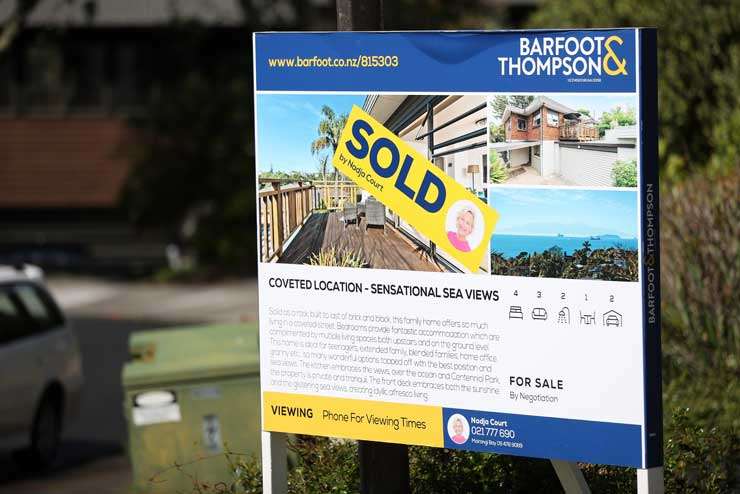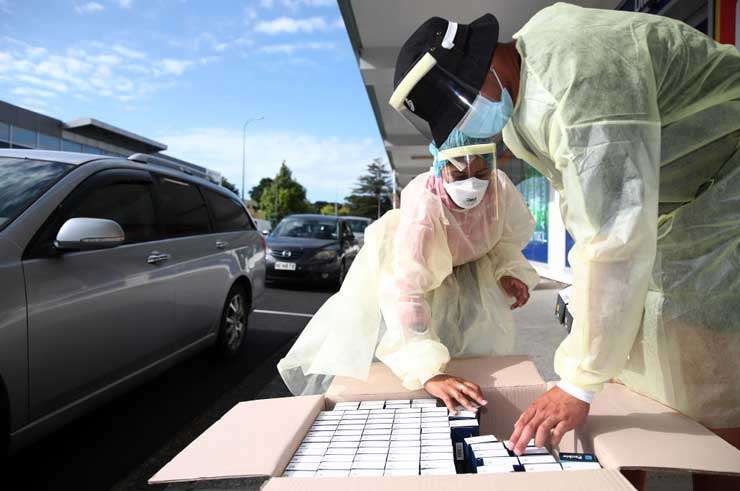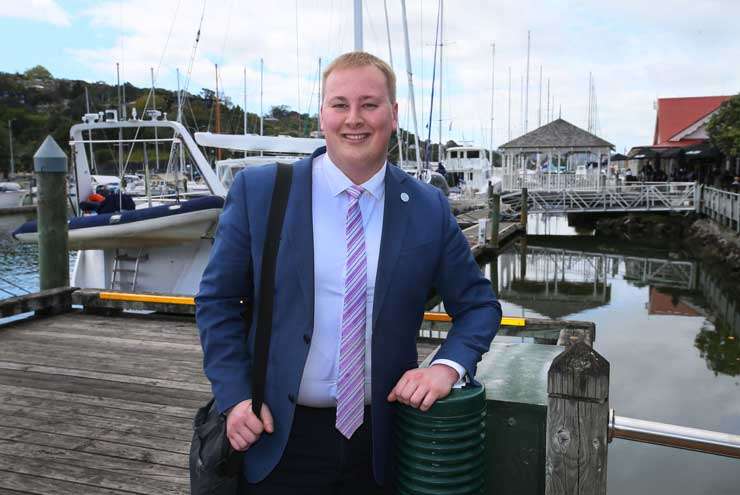The worst of the Omicron wave has yet to hit but the housing market, already feeling the pinch from interest rate rises and tighter lending rules, is showing worrying signs.
Auckland’s largest real estate agency, Barfoot and Thompson, reported 750 sales in February – a 6% drop on the previous month and 33% down on February last year.
House price figures released by OneRoof and its data partner Valocity at the start of the week highlighted a sharp slowdown in value growth across much of the country. Separate figures from CoreLogic and REINZ paint the same picture: after 18 months of exceptional growth, the housing market appears to have run out of juice.
And it’s in this weakened state that the market is facing a new challenge: Omicron.
Start your property search
Several agencies have told OneRoof that new listings are well down on where they should be at the start of the real industry’s busiest month. Figures from OneRoof support their claims.
New listings on the site, and other real estate listing platforms, have fallen away, as vendors take a step back.
Barfoot & Thompson managing director Peter Thompson told OneRoof: “Generally March is our busiest month, but we’re battling through Omicron and people are a bit frightened. Once we’re through the next two or three weeks, we might see more life come back [into the market].”

A sold sign outside a home on Auckland’s North Shore. Barfoot & Thompson reported a year on year drop in its February sales figures. Photo / Fiona Goodall
Thompson said that the agency’s sales for February were 374 shy of its sales for February 2021, which he noted was an “exceptionally busy month”.
“February’s prices and sales numbers are down on those for the previous three months and are now in line with those being achieved midway through last year.”
Thompson said February 2022 sales volumes were more in line with February sales for 2016-2020 – when, OneRoof notes, Auckland was in slump.
Thompson said the average sales price for February was still the fourth highest on record, but this more to do with the composition of sales stock and the larger share of sales in higher price brackets.
This week three properties sold for over $5m under the hammer at Barfoot & Thompson auctions: a property in Sterling Road, Remuera sold for $5.25m, one in Argyle Street, Herne Bay for $5.2m and another In Kings View Road, Mount Eden for $5.01m.
“At $1,196,036, the average sales price for February is still the fourth highest on record, and 11.2% higher than at the same time last year,” he said, adding that the figures indicated “last year’s aggressive rate of price rises has peaked, and price increases are easing back as buyers take a more cautious approach”.
“March sales data will give a better indication as to whether the market is in for a more stable year. Vendors will also have had time to reflect on the changing price environment, and whether they need to trim price expectations to achieve a sale.”
He said that new listings for the agency in February were, at 1077, “modest for this time of the year but combined with the lower number of sales it has increased the number of properties we have for sale at month end to 4385. This is the highest number of properties we have had for sale at month end in nearly three years.”

Heath workers hand out Rapid Antigen Tests to a waiting queue of cars in Henderson, Auckland. Photo / Getty Images
Thompson said it was too soon to predict what might happen in March, but early indicators showed new listings were coming through.
“We saw a lot of people holding off in January, getting their properties ready, and a big increase in listings after the holidays in February 10.”
Independent economist Tony Alexander told OneRoof that while national sales figures for the month of February are not showing the firm upward trend you’d expect at this time of year and there has not been a wave of selling.
“My survey of real estate agents this month is showing that FOMO is zero, fear of over-paying is high and people are not showing up to auctions or open homes,” he said.
“The exception is Queenstown, where people believe the tourists will come.”
“My interpretation is that it’s just a phase, a corrective phase, but it’s just a phase. We’ve got lots of things coming together all at once and people are getting more reactive.”

Barfoot & Thompson managing director Peter Thompson says buyers are taking “a more cautious approach”. Photo / Supplied
Alexander added that last year’s market over-shoot was unsustainable, so it is now correcting, but the market was unlikely to see a rise in mortgagee sales.
“Developers will feel the pressure if they don’t get the pre-sales they need for a project - they’ll be the first to fall over. Last time, in the GFC the early indicators were used car dealers in South Auckland, this time I think it’s the developers, also in South Auckland.”
South Auckland Harcourts Papatoetoe business owner Harsimran Singh said that while his office had done a “decent” amount of business in February, there were clear signs that the market had slowed.
“Buyers who were looking to do flick-on sales, that’s stopped.”
Singh noted that many agents were in denial about the changes in the market and were reluctant to have difficult conversations with vendors around price expectations.
He added that numbers at open homes had dropped “but a lot of people are filtering through the crap to find the genuine deals”.
Ray White agent Craig Smith said that in his patch of West Auckland, quality properties around the $1.5m to $2m price range were still moving. However, he sounded a warning on new listing numbers.
He said that February new listings were similar to January’s, which were strong, “but February should be a lot higher, not the same. We had a good rush at the beginning of new listings, but now they’re generally down and open homes are at about half what they would have been.”
On the North Shore, Harcourts agent David Ding said that buyer interest depended very much on the property. In his 10 open homes this weekend, one standout property had 15 buyers through, another couple had a handful of people, but for the rest “it’s dead”.
“There’s a huge increase in the number of listings on the North Shore – 1550 today compared to 900 last year – so buyers have more choice, they start to get more picky.”

Valocity head of valuations James Wilson: “We saw activity come to a grinding halt when we had other Covid waves.” Photo / Fiona Goodall
However, he said genuine sellers were still listing – almost all, he noted, were heading out of Auckland for cheaper housing, or over to Australia. “In auctions, I used to just sit back. But the last two, it’s taking 35 minutes to negotiate the deal, it’s like pulling teeth. I can’t relax, if I lose one or two buyers now, it’s game over.
“The [price] gap is around 10%, but buyers are saying ‘I’m not paying that price, I see a further drop coming, so I’ll only pay that’.”
Barry Thom, co-owner of UP Real Estate, told OneRoof that on the back of heightened apprehension around Covid, interest rates and even the Russian invasion of Ukraine, the market had changed and deals were harder to close. “Give it 30 days and it will all be different. Clarity will come soon enough.”
Ray White Australia and New Zealand economist Nerida Conisbee said the Omicron wave had had an impact on Australia’s housing market, but sales had surged post peak and post lockdown.
"But the big change has been a slowing in price growth. Prices have been pretty stable since January and we are no longer seeing a surge in price growth.
“This is being driven by a lot of things – concerns about Omicron seem to have eased but we are now facing a higher likelihood of an early than expected interest rate rise, borders are reopening so people are travelling again, people are spending money on other things besides property, our regulators are starting to step in to restrict finance growth.
“The market is by no means in a bad state – it is more that focus has shifted elsewhere which has calmed things down.”
She attributed the price fall in New Zealand to interest rate rises and credit restrictions. “This would have been a significant dampener on sentiment and people’s ability to get finance.”
James Wilson, director of valuation at Valocity, said the changes in the market were not a surprise.
“We saw activity come to a grinding halt when we had other Covid waves. People really pause their purchasing during those waves, and we already have investors and first home buyers acting very cautiously because of the OCR rises and interest rates.”
Asked if the market had hit a wall, he replied: “I think we have a housing market that’s reached the natural end of its cycle. We have house price growth fatigue.”

Infometrics economist Brad Olsen says the market is not on the verge of collapse. Photo / Tania White
Kiwibank senior economist Jeremy Couchman said that while it was too early draw conclusions, vendors may be sitting and waiting until the Omicron wave passes.
“I think Omicron will be a short and sharp shock.”
However, the effects of tighter credit rulers would continue to linger in the market.
Currently Kiwibank is predicting a 1-2% house price fall for the year, but was keeping an eye on the effect of the CCCFA before revising that prediction, Couchman said.
Infometrics economist Brad Olsen agreed that the market was challenged but “it would be far too premature to say that the housing market is on the verge of collapse or anything like that”.
“We know that there is still an imbalance between supply and demand. And a lot of that additional building that New Zealand is looking to do is still yet to come online.
“This could well be a pullback from the heady heights we saw previously. The start of a moderating pace of activity. But certainly, there is still enough activity happening. There was enough lending that went on throughout December and January to show us that there is still a fair bit of activity (in the market).”
- additional reporting Diana Clement




















































































